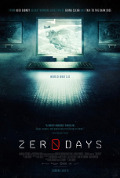
Directed by
Alex Gibney
116 minutes
Rated PG
Reviewed by
Bernard Hemingway

Zero Days
Synopsis: An exploration of the rapidly developing phenomenon of cyber-warfare.
Alex Gibney’s brilliant documentary on the spectre of cyber-warfare is like the unseen part of the iceberg that was Oliver Stone’s recently released Snowden. For anyone interested in the territory touched on in that film, Zero Days will be essential viewing.
With films such as Taxi To The Dark Side (2007) and Mea Maxima Culpa:Silence In The House Of God (2012) Gibney has shown himself to be a master documentarian but Zero Days is arguably his most important film yet because it brings to light a little known phenomenon of our 21st century world – cyber-warfare.
We’ve all had our daily vulnerability brought home to us when we get a computer virus or our bank’s internet goes down. Zero Days amply demonstrates that this vulnerability extends to the very foundations of our modern globally-connected world. Which of course to anyone of passing intelligence means that in the event of war anyone who can take down their enemy’s IT infrastructure, wins. Suicide bombing? Forget about it. Take out your opponents' electricity supply and their world collapses. The scary thing about Zero Days is not that it points this out but that it demonstrates that it's already going on (as is revealed at the film’s end the U.S. has in place a program called Nitro Zeus that is designed to destroy Iran’s entire infrastructure). And what is even more scary is that we can assume that similar programs are being developed in Russia, China, Nth Korea and so on.
Gibney original intention was to make a film about the 2010 Stuxnet computer virus which was used by the security agencies of the U.S. and Israel during the Bush administration to attack Iran’s nuclear program. What this led him to was the covert existence of already highly developed programs of cyber-warfare in a scenario that suggests a kind of Dr Strangelove-ish Cold War paranoia. Thus, in a blackly comic turn of events the highly sophisticated Stuxnet virus was identified after it “escaped” its target destination in Iran because its co-developers, Israel, made it too aggressive. The Iranians in turn counter-attacked on a major Saudi Arabian oil supplier and several US banks and not only did their uranium enrichment program quite quickly revive and become stronger than before, but they rapidly built the equivalent of the US Army’s Cyber Command using young home-grown geeks. You can practically hear the ghost of Slim Pickens wheezing in the background. (Whilst the Bush administration was a perfect fit for this kind of hawkish folly, and George W. initiated the program, most of the work has been done on President Obama‘s watch).
Which takes us back to Edward Snowden who was just one of the faceless minions feverishly working on developing computer programs that could eventually be used to attack actual and perceived enemies of the U.S. One of the issues that Zero Days canvasses is that of state secrecy and its role in facilitating these kinds of no-win scenarios, something which many of the interviewees, a goodly portion of them former high-ranking government employees, confirm. It puts Snowden's much-maligned (by the Obama administration amongst many others) whistle-blowing in a very good light.
Zero Days demands your attention. Right or wrong it shows the truth of the old saw, “violence begets violence”. Don’t miss it.
FYI: Zero Days will screen as part of the Lies and Secrets program commencing 13 October at ACMI. For more information see the website.

Want more about this film?


Want something different?




